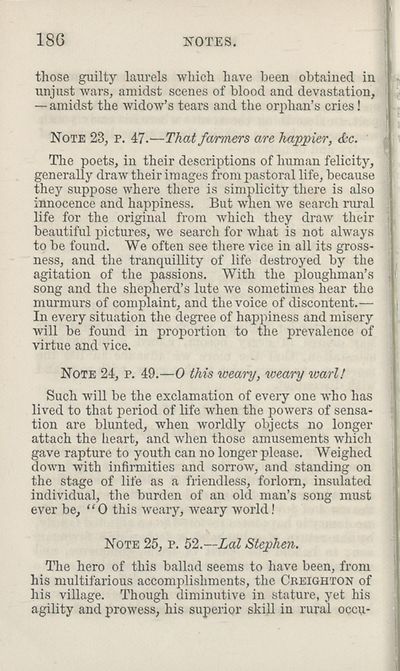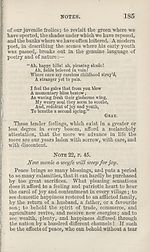Download files
Complete book:
Individual page:
Thumbnail gallery: Grid view | List view

18G
XOTES.
those guilty laurels which have been obtained in
unjust wars, amidst scenes of blood and devastation,
— amidst the widow’s tears and the orphan’s cries!
Note 23, p. 47.—That farmers are happier, <kc.
The poets, in their descriptions of human felicity,
generally draw their images from pastoral life, because
they suppose where there is simplicity there is also
innocence and happiness. But when we search rural
life for the original from which they draw their
beautiful pictures, we search for what is not always
to be found. We often see there vice in all its gross¬
ness, and the tranquillity of life destroyed by the
agitation of the passions. With the ploughman’s
song and the shepherd’s lute we sometimes hear the
murmurs of complaint, and the voice of discontent.—
In every situation the degree of happiness and misery
will be found in proportion to the prevalence of
virtue and vice.
Note 24, p. 49.—0 this weary, weary warl!
Such will be the exclamation of every one who has
lived to that period of life when the powers of sensa¬
tion are blunted, when worldly objects no longer
attach the heart, and when those amusements which
gave rapture to youth can no longer please. Weighed
down with infirmities and sorrow, and standing on
the stage of life as a friendless, forlorn, insulated
individual, the burden of an old man’s song must
ever be, “O this weary, weary world!
Note 25, p. 52.—Lai Stephen.
The hero of this ballad seems to have been, from
his multifarious accomplishments, the Creighton of
his village. Though diminutive in stature, yet his
agility and prowess, his superior skill in rural occu-
XOTES.
those guilty laurels which have been obtained in
unjust wars, amidst scenes of blood and devastation,
— amidst the widow’s tears and the orphan’s cries!
Note 23, p. 47.—That farmers are happier, <kc.
The poets, in their descriptions of human felicity,
generally draw their images from pastoral life, because
they suppose where there is simplicity there is also
innocence and happiness. But when we search rural
life for the original from which they draw their
beautiful pictures, we search for what is not always
to be found. We often see there vice in all its gross¬
ness, and the tranquillity of life destroyed by the
agitation of the passions. With the ploughman’s
song and the shepherd’s lute we sometimes hear the
murmurs of complaint, and the voice of discontent.—
In every situation the degree of happiness and misery
will be found in proportion to the prevalence of
virtue and vice.
Note 24, p. 49.—0 this weary, weary warl!
Such will be the exclamation of every one who has
lived to that period of life when the powers of sensa¬
tion are blunted, when worldly objects no longer
attach the heart, and when those amusements which
gave rapture to youth can no longer please. Weighed
down with infirmities and sorrow, and standing on
the stage of life as a friendless, forlorn, insulated
individual, the burden of an old man’s song must
ever be, “O this weary, weary world!
Note 25, p. 52.—Lai Stephen.
The hero of this ballad seems to have been, from
his multifarious accomplishments, the Creighton of
his village. Though diminutive in stature, yet his
agility and prowess, his superior skill in rural occu-
Set display mode to:
![]() Universal Viewer |
Universal Viewer | ![]() Mirador |
Large image | Transcription
Mirador |
Large image | Transcription
| Antiquarian books of Scotland > Poetry > Ballads in the Cumberland dialect > (190) |
|---|
| Permanent URL | https://digital.nls.uk/125707495 |
|---|
| Description | Thousands of printed books from the Antiquarian Books of Scotland collection which dates from 1641 to the 1980s. The collection consists of 14,800 books which were published in Scotland or have a Scottish connection, e.g. through the author, printer or owner. Subjects covered include sport, education, diseases, adventure, occupations, Jacobites, politics and religion. Among the 29 languages represented are English, Gaelic, Italian, French, Russian and Swedish. |
|---|

